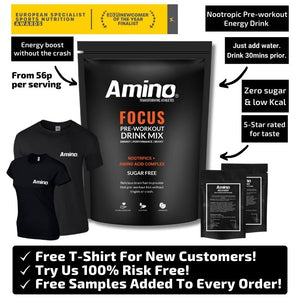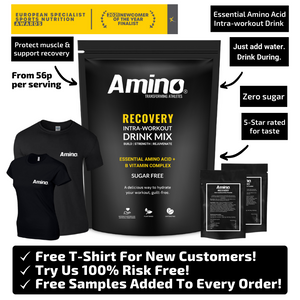Having your head in the right place can have a big impact on your workout – and support your muscle growth to boot. Read on to find out more.

The mind is a pretty powerful tool, which is why training it in combination with your body can have a huge impact on your performance in the gym. To help you make the most of your workouts, try these mindset tips.
1. Focus all your mental energy on the task
We’ve all fallen into the trap of going to the gym, zoning out and then beating a hasty retreat. You may have hit all your reps, but if you haven’t focused on the activity itself, you could have missed out on the full benefits of your workout.
This is because focusing on what you do, and on each muscle as it works, strengthens the neuromuscular pathways in your brain. At the neuromuscular junction, the impulse to activate a muscle transfers from your nervous system to your muscle fibres, resulting in movement. By improving this communication with concentration, you can improve the muscle’s function. As a result, research has found that intense focus can not only prevent the atrophying of muscle, but also make it stronger.
2. Visualise success
Time spent physically training is essential if you want to grow muscle, but did you know that visualising a workout can also help?
Research has found that combining visualisation with physical training is more efficient than physical execution alone. Motivational self-talk and imagery also improved muscular power and strength performance in another study of healthy combat sports practitioners.
This is because visualising an activity or movement creates brain patterns that enhance your skill through repetition. You can recall this over and over, without it taking a toll on your body. This can be particularly helpful if you’re injured and unable to workout.
3. Develop internal motivation
We’re all motivated by results, such as winning a bodybuilding competition or seeing your muscle measurements increase. But the strongest motivators are intrinsic, from our own passions and interests.
Intrinsic motivators give you a positive emotional return. For this reason, they are longer lasting than extrinsic motivators. This makes them very powerful when it comes to long-term motivation and keeping yourself going to the gym.
To cultivate intrinsic motivation, a psychological concept known as self-determination theory suggests that you need to meet the needs of autonomy, competence and relatedness.
Your autonomy refers to your perceived control over when and how you do something. You could try satisfying this by designing your own workouts and working out at a time that suits you.
To satisfy competence, you need to pitch your workout to a level that is achievable but not too easy.
For relatedness, you need to feel a connection with others, so you could try working out with a friend or discussing your results virtually on a sports app or forum.
4. Rest (and sleep)
It can be easy to fall into the mindset that rest is only for the wicked and that it won’t help you to reach your goals. But changing this mindset to accept that your body needs rest is crucial.
This is because your body needs time to synthesise protein to repair the muscles that you have worked out. Failing to do so can mean that you don’t gain muscle. Indeed, it could even lead to muscle loss because you never have a chance to recover.
A well-earned break can also help you to keep your motivation fresh, which will also benefit you in the long run.
READ MORE: Find out why rest is important
ENJOYED THIS ARTICLE?
SOURCES
https://pubmed.ncbi.nlm.nih.gov/29533715/
https://pubmed.ncbi.nlm.nih.gov/26700744/
https://sites.psu.edu/psych256sp14/2014/04/20/visual-imagery-sports-psychology
https://www.ncbi.nlm.nih.gov/pmc/articles/PMC4974856/
https://link.springer.com/article/10.1007/s11332-016-0267-z
https://positivepsychology.com/intrinsic-motivation-examples/
https://www.verywellfit.com/the-importance-of-resting-between-workouts-2911191






